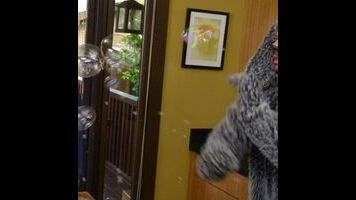Wilfred finally nailed it. This was the episode I’d been waiting for, where the work it’s done to build its characters and its themes finally all work together. It also makes sense that its biggest success comes when it integrates the guest star of arguably the most intriguing episode of the first season—Bruce, played with delicious weirdness Dwight Yoakam—with one of the brightest spots of this second season, Allison Mack’s Amanda. It also directly addresses the premise of the show, a risky tactic, but a rewarding one here.
The premise is simple: Ryan and Amanda are getting involved enough that they decide Amanda should move in. The night before the move, Wilfred brings Bruce, the only other human who can see Wilfred as a talking dog, to show Ryan the “truth” about Amanda. But Bruce doesn’t want to without getting something from Ryan, triggering a game. So what makes this story so successful?
It’s disorienting: Wilfred is the story of a guy who is the only person who sees a talking dog. The tension between what Ryan sees, and what everyone else sees, drives the show both comedically and dramatically. But if we become too comfortable with Wilfred and Ryan’s relationship, then the show loses its edge. Bringing Bruce into the relationship disorients the viewer by changing those dynamics. The question isn’t “How will Wilfred teach Ryan this week’s lesson?” but instead “Okay, what exactly is going on here?”
There has to be a twist, but exactly what it will be is up in the air. Sure, it turns out to be the most expected twist—Bruce is working with Wilfred again—but other options were plausible. And the end result, the bomb-looking clock counting up, showing how much time Ryan’s been playing Calvinball, is the perfect mix of devastating, amusing, and effective.
Wilfred is sidelined: Along with “Guilt,” “Truth” doesn’t use Wilfred exclusively as Ryan’s foil. In that episode, it was Ryan’s sister, with Wilfred providing commentary. In “Truth,” it’s Bruce, with Wilfred providing commentary again. I seem to enjoy this show best when it allows Wilfred to be funny (“I’ll just have to tell you when I’m happy,” he says, putting his tail on the line in a bet) and instigate conflict without being the center of the conflict himself.
It’s meaningful: Most television shows have a status quo that they revert to at the end of even the most challenging episodes. Wilfred hasn’t been an exception, doing whatever it can to maintain the Ryan/Wilfred hang-out dynamic it’s built around. But it can build tension for drama and comedy out of changing the show’s other characters. The Ryan-Amanda dynamic has been pleasant and amusing enough that I want it to continue, but “Truth” challenged it directly.
The episode ends with Ryan breaking up with Amanda, and Wilfred doesn’t shy away from the emotional impact of that. Mack plays it straight, and plays it well. Ryan’s likely insanity forces realistically prevents him from being involved in a happy relationship. Even if I want it to happen, it’s more plausible and, yes, meaningful that he can’t bring himself to maintain their relationship.
It’s got a montage: This is Wilfred’s new secret weapon. After the recent dancing episode, here we have Ryan and Bruce playing their ridiculous games. A good montage is useful anywhere, but I think that the weird comic nature of Wilfred makes it especially effective. We can see the strangeness, and interpret it quickly in a way that makes the show look weird in the way we want it to look. I may regret this saying this, just as I came to regret saying that Bob’s Burgers imagination sequences were its best only to be confronted with far too many of them. But for now, I’m delighted each time Wilfred utilizes the form.
It directly addresses the premise: “Bullshit!” declares Ryan repeatedly through the episode. He’s talking to Wilfred telling him that he’s crazy, but he’s also serving as an audience surrogate. We’ve seen plenty of bullshit from Wilfred before, and Ryan calling him on it seems accurate. But that just serves as the impetus for Wilfred to demonstrate that he’s not just randomly a talking dog. Throughout “Truth” he serves as a manifestation of Ryan’s anxieties. Even if you’re not literally insane enough to see a talking dog, that first move-in of a relationship is a stressful time. Ryan hiding the manifestations of his insanity—his medication both legal and illegal, his relationship with Wilfred—is a simple encapsulation of the fear people feel about sharing their lives with someone. “Those things aren’t me. Not anymore.”
Using Wilfred, a primarily comic figure, allows the show to walk the fine line between irony and sincerity. “Ryan, you’re buried under a box of secrets with a talking dog in a basement that may not even exist” is as on-the-nose as you can get, which makes it amusing. But it’s also about how Ryan should see Wilfred and their adventures together.
“Truth” manages to hit Wilfred’s sweet spots: it’s weird while being meaningful, and it uses the specifics of Ryan’s situation to talk about more universal anxieties. It’s easily the best episode of the series to date.
Stray observations:
- Ryan’s Dad Watch: We get his voice on the phone! This show has done a surprisingly great job of building up its supervillain. Given its success with surprising/entertaining guest stars, I’m really looking forward to seeing how this plays out.
- “You’re looting my kitchen dressed like one of the Wolverines, so…” Starting with its most amusing scene is a good to have a primarily dramatic episode avoid seeming unfunny.
- “That’s the problem with this particular game. Even when you win. You lose.”








































